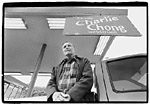“HE’S WAITING FOR you,” says the mechanic, with a hint of an amused smile. “Right inside the office.” The “office” is a grimy little room cluttered with random junk—papers, shoes, a sewing machine, a defunct microwave oven—that has not budged in decades. In a soiled chair sits a man who looks like he, too, has been gathering dust here since the ’50s.
I’ve arrived at the used car lot belonging to 78-year-old Fred Bucke, anti-tax crusader, scourge of the downtown political elite, coauthor (with his friend Linda Jordan) of the Voters Pamphlet screeds opposing pretty much everything city leaders want. Of 15 propositions that the mayor is asking voters to approve this year—most of them arcane and seemingly harmless changes to the city charter—Fred takes issue with nearly all. He is opposed to a levy to rehab the Opera House. He is opposed to making the language of the city charter “gender neutral.” He opposes the proposal to “eliminate references to the Auditing committee in order to conform with current financial practices.”
If you need a “Statement Against,” Fred’s your man.
“Why would they put 15 on all at once?” he asks, over the din of Lake City Way traffic coming through the front door. “Maybe they felt it would obscure the ones that are more important. It gets you a little suspicious. They say, ‘It won’t make any difference, just vote for it.’ But some are very important.” He points, for example, at Proposition 14, which would free city staffers from having to take an oath of office. “I’ve been an inspector at the polls in Bryant for 10 years,” says Bucke. “I show up at 6am, and before we do anything we have to take the oath of office. These people are privy to a lot of sensitive information. Why shouldn’t they take an oath?”
Bucke’s used car lot, a former gas station, is located on Lake City Way, right off I-5. (Just look for the “I’m with Charlie Chong” sign hanging from the canopy. “Charlie’s a boat-rocker,” says Bucke with a grin.) Truth is, Fred got out of the car business some time ago; he now rents his lot to the Little Wild West used car dealer, which expanded from up the street. But Fred still uses his high-visibility location as a political billboard and maintains his little office. A hand-scrawled note that’s taped across the dial pad of his phone (seeming to render it unusable) warns everyone from Little Wild West that this is Fred Bucke’s phone and is not to be touched. “This means you!”
To talk with Fred Bucke is to confront a side of Seattle that is all but invisible amid the prevailing culture of high-tech riches, downtown “revitalization,” and “visionary” projects for bettering the city. Fred sees a government of empire-builders who are creating a gigantic and ever-rising pyramid of taxation with absolutely no concern for the people who are affected. The property tax, he points out, carries no upper limit. “Whatever the market rises to, that’s what you have to pay.” In the early part of the century, Bucke says, property in Seattle was assessed at only 25 percent of its market price, but it has since been hiked up to 100 percent. The levy for refurbishing the Opera House (Proposition 1) will add another $72 million to our property tax bill and comes on top of what Bucke calculates as $1.5 billion in additional property taxes—much of it capital and maintenance levies for the school district—that have been added for local residents in just the last five years.
Fred’s own northeast Seattle home, it turns out, is one I have driven by—and wondered about—many times. Amid the tall grass in front, two scruffy Volkswagen Beetles sit undisturbed, a perpetually half-open garage door resting on one of them. The only suggestion that the house is inhabited are the signs in the front yard, which change every election season to oppose whatever big-money proposal is on the ballot: the Commons, the RTA, and now, the Opera House.
“Any property owner with a brain realizes you have to maintain what you have,” says Bucke. “But the city lets everything go to rack and ruin while blowing money on their pet projects like Gateway Tower.” While Fred says he would have preferred a “more moderate” measure than I-695, the car-tab tax cut, he’s supporting it anyway as “a shot across the bow of these governments that they’ve gone too far. If you vote no [on 695], you’re saying to Gary Locke and Ron Sims and Paul Schell, ‘We approve what you’re doing, we’ll pay anything you impose.'” At that point, he says, “They’ll just go berserk.”








